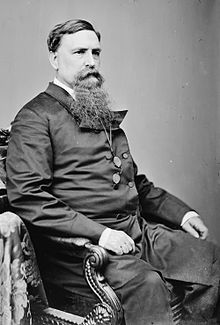
Back توماس سوان (سياسي) Arabic ثوماس سوان ARZ توماس سوان AZB Thomas Swann German Thomas Swann French Thomas Swann Latin Thomas Swann (polityk) Polish Thomas Swann Swedish
This article includes a list of general references, but it lacks sufficient corresponding inline citations. (September 2010) |
Thomas Swann | |
|---|---|
 | |
| Member of the U.S. House of Representatives from Maryland's 4th district | |
| In office March 4, 1873 – March 3, 1879 | |
| Preceded by | John Ritchie |
| Succeeded by | Robert Milligan McLane |
| Member of the U.S. House of Representatives from Maryland's 3rd district | |
| In office March 4, 1869 – March 3, 1873 | |
| Preceded by | Charles E. Phelps |
| Succeeded by | William J. O'Brien |
| 33rd Governor of Maryland | |
| In office January 10, 1866 – January 13, 1869 | |
| Lieutenant | Christopher C. Cox |
| Preceded by | Augustus Bradford |
| Succeeded by | Oden Bowie |
| 19th Mayor of Baltimore | |
| In office November 10, 1856 – November 12, 1860[1] | |
| Preceded by | Samuel Hinks |
| Succeeded by | George William Brown |
| Personal details | |
| Born | February 3, 1809 Alexandria, Virginia, US |
| Died | July 24, 1883 (aged 74) Leesburg, Virginia, US |
| Political party | American (1856–1860) Union (1861–1866) Democratic (1866–1879) |
| Alma mater | The George Washington University |
| Profession | Politician |
| Signature | |
Thomas Swann (February 3, 1809 – July 24, 1883) was an American lawyer and politician who also was President of the Baltimore and Ohio Railroad as it completed track to Wheeling and gained access to the Ohio River Valley. Initially a Know-Nothing, and later a Democrat, Swann served as the 19th Mayor of Baltimore (1856–1860), later as the 33rd Governor of Maryland (1866–1869), and subsequently as U.S. Representative ("Congressman") from Maryland's 3rd congressional district and then 4th congressional district (1869–1879), representing the Baltimore area.[2]
- ^ "Thomas Swann (1809-1883)". Biographical Series. Archives of Maryland.
- ^ Frank F. White, Jr., The Governors of Maryland 1777-1970 (Annapolis: The Hall of Records Commission), 165-170. available at https://msa.maryland.gov/megafile/msa/speccol/sc3500/sc3520/001400/001464/html/1464extbio.html